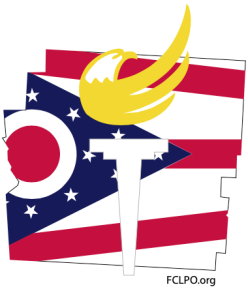We need your help to get the Libertarian Party regain ballot access in Ohio. This article helps explain what ballot access is, why it is important to us, and why the Libertarian Party of Ohio does not currently have it. To volunteer, check the “Circulate Petitions” or “Validate Petitions” box on the Volunteer form.
What is “ballot access”?
“Ballot access” is the right to put a political party label under a candidate’s name on the ballot. Having ballot access also enables a party to hold a primary. Under Ohio law (ORC 3501.38, amended in 2013 by Senate Bill 193), a political party must get 3% of the vote for Governor or 3% of the vote for President to gain ballot access for four years. The party must again get 3% of the vote for President or Governor to renew its access for another four years. Supporters of SB 193 designed and timed this bill to prevent the Libertarian Party of Ohio (LPO) from appearing on the ballot in 2014. To correct this injustice, the LPO filed several lawsuits. The federal district court in the first case, Libertarian Party of Ohio v. Husted, ordered the Secretary of State to keep the LPO on the ballot in 2014 (Court documents). This case went to the Supreme Court of the United States, which decided to let stand a federal appeals court ruling against the LPO. A suit filed in the state court system in 2015 challenged the constitutionality of SB 193 on the basis of Article V, Section 7 of the Ohio Constitution.
In the most recent case, State ex. rel. Fockler v. Husted, decided January 20, 2017, the Court ruled that Gary Johnson’s 3.17% vote for President did not qualify the Libertarian Party to get on the ballot, despite the clear wording of Section 3517.01(A)(1)(a) of the Ohio Revised Code. The dissenting justice, William O’Neill observed that the majority ruling involved “circular reasoning,” The LPO filed for reconsideration, which is currently pending in the Ohio Supreme Court.
Why the Party needs to circulate petitions now
The short answer
The short answer: The law requires us to circulate petitions containing more than 55,000 valid signatures (with at least 500 each from eight of Ohio’s 16 Congressional Districts), and file them by August 2018 to allow our candidates to show the Libertarian label on the ballot. Because petition gathering usually results in a large number of invalid signatures, the state party will attempt to gather at least 110,000 signatures statewide. The Libertarian Party of Ohio office will be open throughout this year to receive and validate signatures using a method proven successful in our effort to get our 2016 Presidential candidate Gary Johnson on the Ohio ballot as an independent. Volunteers are validating the signatures in a process so laborious that — to do the process correctly — it would take a full-time employee over a year and a half to validate the petitions.
You can help us get back on the ballot by circulating petitions and validating them. This link will let you download petition forms and inform you of state validation events. The Franklin County Libertarian Party is planning additional circulation and validation events. For dates and times, see our Facebook page. For additional information, contact Tricia Sprankle, state political director and petition coordinator.
The long answer, including juicy details
In 2014, Charlie Earl, Libertarian candidate for Governor, submitted petitions containing 1,478 signatures, far more than the 500 signatures required by law. After Secretary of State Jon Husted’s office unofficially indicated that the petitions were acceptable, it received a protest that some of them did not include a properly completed statement naming the employer of a paid circulator (who in fact was an independent contractor). This statement is required by law, but was never enforced. Following that protest, petitions containing over half of Charlie Earl’s signatures were invalidated, disqualifying him from the ballot. Because the protest was filed at the last minute specified by law, Mr. Earl had no opportunity to respond to the protest or to take any corrective action. It therefore became impossible for the Libertarian Party to secure the 3% vote for governor required to stay on the ballot. This was one of the issues in Libertarian Party of Ohio v. Husted, which the Ohio Supreme Court unanimously decided in favor of the Secretary of State (Source). A second suit filed at the same time, State ex. rel. Linnabary v. Husted, was filed by Attorney General candidate Steve Linnabary, whose petitions was rejected on the same grounds.
The Ohio Republican Party’s involvement
Ohio law requires that a protester must be a member of the same political party as the candidate. The protester in this case was Gregory Felsoci, a carpenter and registered Libertarian living near Akron. The judge in an opinion referred to Mr. Felsoci as a “guileless dupe,” whose testimony “lacks even a basic understanding of the nature of the protest he agreed to sign.”
Testimony revealed that an operative in the Kasich for Governor campaign, Terry Casey, with the help of a local Republican, found Mr. Felsoci and persuaded him to sign the protest. Despite having very limited means, Mr. Felsoci was soon represented by the high-power Columbus law firm of Zeiger, Tigges & Little. Mr. Casey testified in September that he took responsibility for paying Mr. Felsoci’s legal bills, and would look for donors to pay them.
The “donor” turned out to be the Ohio Republican Party (ORP). In a filing to the Ohio Elections Commission at its hearing May 8, 2015, the ORP admitted to spending $300,000 to pay Zeiger, Tigges & Little the costs of representing Mr. Felsoci (newspaper story). (This figure is now estimated to be greater than $575,000).
The extraordinary timing of the protest was made possible by e-mails and texts made between Mr. Casey and two employees of the Ohio Secretary of State, Matt Damschroder (Director of Elections) and Jack Christopher (General Counsel), which began two weeks before the protest was filed.
These facts make it clear that the Ohio Republican Party and Gov. Kasich’s campaign conspired to keep Charlie Earl off the ballot, fearing that the Libertarian vote in a close race would have resulted in a Democratic victory for governor.
There is no evidence to suggest that Gov. Kasich had any personal knowledge of Mr. Casey’s or the ORP’s activity. This is to be expected. Campaign operatives take great care to hide such operations from their candidates, to give them “plausible deniability.” However, it would be fair to question the Governor about the character of the people he retained to work for his election.
Help us get back on the ballot by circulating petitions and validating them. This link will let you download petition forms and inform you of state validation events. The Franklin County Libertarian Party is planning additional circulation and validation events. For dates and times, see our Facebook page. For additional information, contact Tricia Sprankle, state political director and petition coordinator.

 UPDATE: Libertarian candidate Johnny Miller will be attending the Ohio Congressional District 15 Candidates Forum this Sunday, March 18th, from 2pm to 4pm.
UPDATE: Libertarian candidate Johnny Miller will be attending the Ohio Congressional District 15 Candidates Forum this Sunday, March 18th, from 2pm to 4pm. An epiphany is “an intuitive grasp of reality through something (such as an event) usually simple and striking.” Libertarian gubernatorial candidate Bruce Jaynes shared with me two epiphanies that could radically change our understanding of politics.
An epiphany is “an intuitive grasp of reality through something (such as an event) usually simple and striking.” Libertarian gubernatorial candidate Bruce Jaynes shared with me two epiphanies that could radically change our understanding of politics.